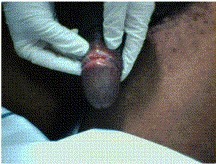Inguinal phlegmon and positive serology for syphilis after penile bite laceration: true, true and unrelated
To view the full text, please login as a subscribed user or purchase a subscription. Click here to view the full text on ScienceDirect.

Fig. 1
Painless penile laceration, 7 days after injury and before antibiotic therapy.
Fig. 2
Computed tomographic transverse section with intravenous contrast, at the level of the femoral heads, showing phlegmon at the time of admission. Arrow indicates 2 × 3–cm lymph node.
Among many causes of penile injury, sexual activity is infrequently reported. The present case involved delay in recognition, which led to development of a phlegmon near major vascular structures. Positive serologic evidence of syphilis was an incidental finding.
To access this article, please choose from the options below
Purchase access to this article
Claim Access
If you are a current subscriber with Society Membership or an Account Number, claim your access now.
Subscribe to this title
Purchase a subscription to gain access to this and all other articles in this journal.
Institutional Access
Visit ScienceDirect to see if you have access via your institution.
© 2008 Elsevier Inc. Published by Elsevier Inc. All rights reserved.
Access this article on
Visit ScienceDirect to see if you have access via your institution.
Related Articles
Searching for related articles..



